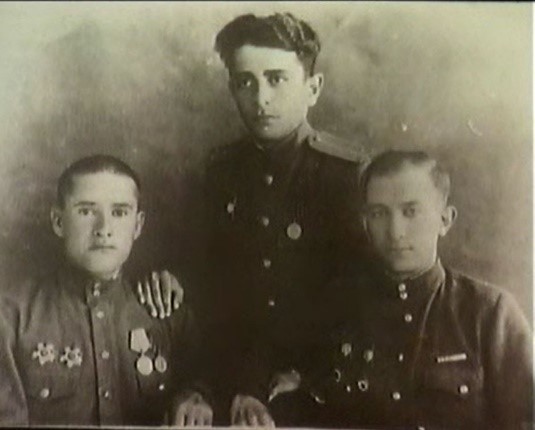Yakov Finkelberg was born in 1921 in Loiev, southeastern Belorussia. In 1927, his family moved to the Crimea, where a new Jewish agricultural region was being formed. Yakov finished high school in the Crimea in 1938. In May 1941, he was drafted into the Red Army and sent to the Lvov region, in the recently occupied eastern Poland (present-day western Ukraine), where he was attached to an infantry division. By the time of the outbreak of the Soviet-German War on June 22, 1941, Yakov had yet to receive adequate military training. Nevertheless, he, along with the other conscripts, was ordered to take part in the defense of Lvov. On June 29, 1941, he was wounded in the leg by a shell fragment and evacuated to a hospital in Kiev, where he spent two weeks.
However, the situation in the Ukrainian capital was desperate, and the patients at the hospital, with Yakov among them, were discharged ahead of time, given their uniforms and weapons back, and moved fifty kilometers west, to stop the German advance. Finkelberg's regiment, like the other units engaged in the defense, failed at this task and retreated to the northeast. In late September 1941, Finkelberg was taken prisoner by the Germans. While in captivity, he stubbornly insisted that he was an ethnic Russian named Yakov Nikanorov, and that his swarthy appearance was inherited from his mother, a Crimean Karaite.
Yakov Finkelberg remained in captivity for two years. Luckily, the Germans did not deport him westward, to Poland or Germany, and he spent all this time in camps in central Ukraine. In September 1943, he managed to escape, and, after much wandering, he joined a Soviet partisan unit in Polesia. His stay with the partisans was a brief one, since the unit met the advancing Red Army shortly thereafter, and was incorporated into it. Finkelberg was assigned to the 929th Separate Communication Battalion of the 47th Rifle Corps, with which he took part in the ongoing crossing of the Dnieper River.
Finkelberg was a frontline fighter for several days, whereupon his commanders became aware of his fluency in German. He was sent to a crash course in military German, and then assigned to the staff reconnaissance of the 280th Rifle Division (later to be transferred to the 121st Rifle Division) as an interpreter; his job was interrogating German POWs. With his divisions, he moved through western Ukraine and Poland, and met V-E Day in Germany, in the area of Wittenberg (Saxony-Anhalt). In the course of the war, Finkelberg was awarded two Orders of the Red Star and a number of medals.
After the end of the war, Finkelberg served as an interpreter in Soviet POW camps. In the late 1940s-early 1950s, he graduated from the Crimean Pedagogical Institute, and went on to work as a teacher of foreign languages. In 1997, Yakov Finkelberg immigrated to Israel. He died in 2012.







